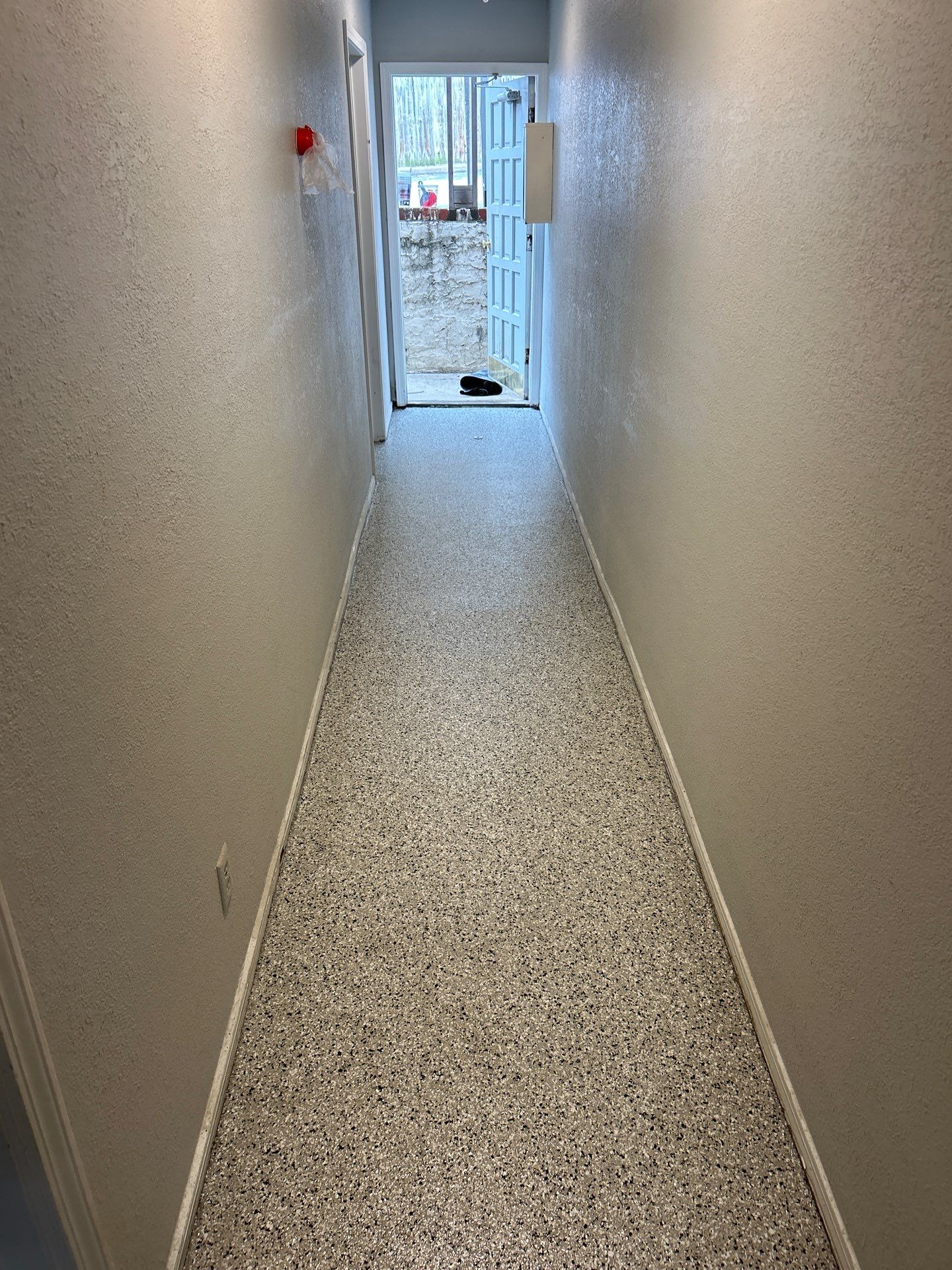Are you dealing with faded, stained, or plain dull concrete floors at home or in your business? You’re not alone!
Many turn to concrete floor coatings for a pretty solid reason: they protect floors from everyday wear and tear and make them look a whole lot better. With all the different types of concrete coatings, picking one that suits your specific needs can feel like a maze.
This article is your guide, breaking down the various types of concrete coatings available and helping you navigate your options based on your specific challenges and aesthetic goals.

What is Concrete Floor Coatings?
Concrete floor coatings are vital for protecting and enhancing the aesthetics of concrete surfaces. Serving as a resilient barrier, these coatings defend against wear, corrosion, and environmental damages such as moisture ingress, UV radiation, and chemical spills, effectively extending the lifespan of the concrete beneath.
Beyond their protective qualities, these coatings offer a range of finishes and colors, transforming dull concrete into visually appealing floors. Several factors, including the level of foot or vehicle traffic, exposure to environmental conditions, and specific durability requirements, influence the selection of the appropriate concrete floor coatings.
Understanding the needs of your concrete surface and the performance characteristics of different types of concrete coatings will guide you to the best choice, ensuring both longevity and aesthetic appeal for various types of concrete floors.
What are the 4 Types of Concrete Coatings?
Each type offers unique benefits tailored to different needs, ensuring your concrete surfaces look great and last longer. Let’s explore these types of concrete coatings more deeply, emphasizing their pros and cons for a well-rounded understanding.
1. Polyurethane Coatings
Polyurethane coatings offer a versatile concrete protection solution, balancing durability and flexibility. These coatings for concrete are known for their ability to withstand significant wear and tear. Beyond car parks and commercial facilities, polyurethane coatings are also suitable for industrial environments, warehouses, and any setting where the floor must endure heavy loads and traffic.
Advantages:
Disadvantages:
2. Polyaspartic Coatings
Polyaspartic coatings are a newer innovation in the concrete floor coatings market, offering fast curing times and durability. Their rapid application and curing process do not compromise on quality or durability, making them an attractive option for many. Polyaspartic coatings are ideal for commercial kitchens, automotive showrooms, and residential garages where durability and fast return to service are important.
Advantages:
Disadvantages:
3. Epoxy Coatings
Epoxy coatings are renowned for their strong adhesive properties, durability, and chemical resistance. They are formed from two main components: a resin and a hardener. When mixed, these components undergo a chemical reaction that results in a rigid, durable coating that adheres strongly to concrete surfaces. Given their properties, epoxy coatings are best suited for industrial settings, garages, and warehouses where their durability and resistance can be fully utilized.
Advantages:
Disadvantages:
4. Acrylic Coatings
Acrylic coatings are water-based sealants that provide a protective, decorative finish to concrete surfaces. They are known for their ease of application and wide range of colors and finishes. Acrylic coatings are particularly well-suited for residential projects, such as patios, pool decks, and decorative finishes where high levels of durability are not the primary concern.
Advantages:
Disadvantages:
Choosing the Right Concrete Floor Coating
Choosing the right coating for concrete involves weighing several factors to ensure your floors not only look great but can also withstand the demands of their environment. Here’s a concise guide to help you navigate through your options:
Environmental Conditions
The environment where the concrete is located plays a significant role in the selection process. For areas exposed to harsh weather, chemicals, or constant moisture, a coating that offers enhanced protection against these elements is crucial. For instance, polyurethane coatings offer UV resistance, which is ideal for outdoor spaces that receive a lot of sunlight.
Traffic Levels
The amount of foot or vehicle traffic the concrete will endure is a critical consideration. High-traffic areas require a more robust coating that can handle the wear and tear without degrading quickly. Polyaspartic and epoxy coatings are excellent for such conditions due to their strength and longevity. These types of concrete coatings are designed to resist heavy use, maintaining their integrity and appearance over time.
Aesthetic Goals
Lastly, the desired appearance of the floor should guide your coating choice. Concrete coatings come in various colors, textures, and finishes, allowing for extensive customization. Acrylic coatings, for example, offer a wide range of decorative finishes and are quick-drying, making them a good choice for projects where aesthetics are a priority.
Wrapping It Up
Choosing the types of concrete coatings can significantly impact your concrete floors’ longevity and aesthetic appeal. Each coating type—be it polyurea, epoxy, or polyaspartic—brings its unique set of benefits tailored to different needs, from enhancing durability against environmental conditions and traffic to meeting specific aesthetic goals. Selecting the right concrete coating is essential for ensuring your floors are well-protected and visually appealing, making your space stand out.
Select Coatings brings a depth of knowledge and expertise, ensuring that the chosen coating system—like our primary work, which includes a base coat of High Solids Polyurea, a full flake broadcast of Polymer Flake, and a top coat of High Solids Polyaspartic—is applied correctly for optimal performance and durability. These components work together to create robust, visually appealing residential and commercial coatings floor systems designed to last.
Call us at 913-349-6689 for a FREE estimate, and let’s transform your space with a floor system designed to meet your needs and exceed your expectations!

